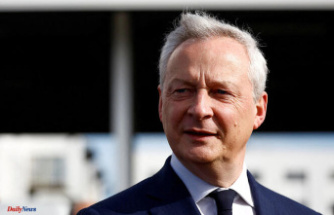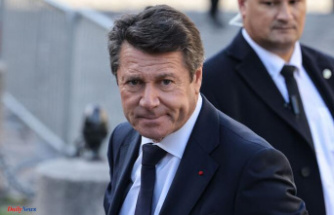Serbia is drawing the wrath of Germany and the EU with a lax visa policy. Because of the increasing number of migrants via the Western Balkans route, Interior Minister Faeser is demanding an immediate reaction from Belgrade. Brussels is becoming clearer and is threatening to withdraw the visa exemption.
In the fight against the sharp rise in migration across the Balkans, the European Union is increasing the pressure on Serbia and other countries. "Serbia must now change the visa practice, not at some point, but now," demanded Federal Interior Minister Nancy Faeser on the sidelines of an EU meeting in Luxembourg. EU Interior Commissioner Ylva Johansson announced that she would push this even harder in talks with the Balkan states. If they are not cooperative, the Swede did not rule out withdrawing their visa-free status for the Schengen area.
The number of people currently seeking protection in the EU is high, comparisons with the 2015/16 refugee movement are emerging. A key difference is that the bulk of the people are from Russia-invaded Ukraine. More than a million Ukrainians have already arrived in Germany, although it is unclear how many of them have left the country. Nevertheless, cities and communities are groaning. And the number of people who most recently came to the EU via the Western Balkans is increasing.
According to the EU border protection agency Frontex, 19,160 irregular entries were registered in September on this route, which also includes non-EU country Serbia. That is twice as many as in the same month last year. According to the information, most migrants come from Syria and Afghanistan. However, an EU document shows that other nations also play a key role. And this is where Serbia, the other Balkan countries and their visa policies come into play.
For example, the authorities registered almost 4,500 irregular border crossings by people from India in the first eight months of the year. In 2021 as a whole, there were around 550. The number of border crossings by people from Tunisia, Cuba or Burundi also increased significantly, but in some cases at a lower level. People from all these countries do not need a visa to enter Serbia. From Serbia they then make their way to the EU - often as far as Germany or Austria.
Compared to Syria (43,567) and Afghanistan (16,237), the numbers are quite low, but the increase is significant. "In 2021, migrants from Turkey, Tunisia, India, Cuba and Burundi accounted for 2.5 percent of all irregular border crossings on the Western Balkan route, and in 2022 so far 20 percent," the EU paper says. However, with a view to the Balkan route, migration researchers emphasize that the situation in 2015 is a long way off.
However, Faeser made it clear what she thinks of Serbia's visa policy: not much. This is "not very nice" because it is based on which states do not recognize Kosovo. "I don't find that acceptable either." In fact, the Serbian visa policy is closely linked to Serbia's claim - which is questionable under international law - to Kosovo, which is almost exclusively inhabited by Albanians. Belgrade is taking revenge on countries that do not recognize or have withdrawn their recognition of the former Serbian province, which has been independent since 2008.
Since 2017, travelers from India do not need a visa for Serbia. Burundi withdrew its recognition of Kosovo in 2018, after which Serbia abolished visa requirements for citizens of the country. According to the EU document, the visa policy of other Western Balkan countries such as Albania or Montenegro also differs from that of the EU, but to a lesser extent.
So what can be done to ensure that fewer unwanted migrants come to the EU? Some EU countries have already established facts. The Czech Republic introduced controls at its border with Slovakia a good two weeks ago. Officials have already apprehended more than 2,500 illegal migrants and more than 50 people smugglers. Slovakia in turn introduced controls at the border with Hungary, Austria at the border with Slovakia. And that despite the fact that stationary border controls in the Schengen area are supposed to be the exception. Germany controls anyway at the border with Austria. There have already been dramatic scenes in the Czech Republic: in the Zlin region, police officers fired warning shots to stop a fleeing smuggler. At the beginning of October, six refugees were seriously injured when their smuggler van crashed while chasing the police.
So something has to be done, on which the interior ministers in Luxembourg largely agreed. According to Interior Commissioner Johansson, there should be more external border protection and there should be closer cooperation with the Western Balkan countries, for example on returns and against smuggling. At least there was some movement on the part of Serbia. President Aleksandar Vucic promised a change in visa policy by the end of the year. However, he did not name any specific steps.
The better arguments in the talks with Serbia lie with the EU, as Faeser found, after all the country is striving to join the confederation. However, this has not yet persuaded Belgrade to join the EU's sanctions against Russia because of the war against Ukraine. Faeser referred to a Balkans conference in Berlin next week, which Serbia would also attend. Czech Interior Minister Vit Rakusan demanded: "Serbia must help us."












